|
|
|
Sort Order |
|
|
|
Items / Page
|
|
|
|
|
|
|
| Srl | Item |
| 1 |
ID:
143475
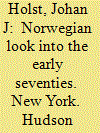

|
|
|
|
|
| Publication |
New York, Hudson Institute, Inc., 1969.
|
| Description |
21p.pbk
|
| Series |
Hudson Institute Paper
|
|
|
|
|
|
|
|
|
|
|
|
Copies: C:1/I:0,R:0,Q:0
Circulation
| Accession# | Call# | Current Location | Status | Policy | Location |
| 007496 | 300/HOL 007496 | Main | On Shelf | General | |
|
|
|
|
| 2 |
ID:
035311
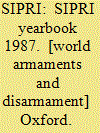

|
|
|
|
|
| Publication |
Oxford, Oxford University Press, 1987.
|
| Description |
xl, 495p.hbk
|
| Series |
SIPRI Yearbook 1987
|
| Standard Number |
0198291140
|
|
|
|
|
|
|
|
|
|
|
|
Copies: C:1/I:0,R:0,Q:0
Circulation
| Accession# | Call# | Current Location | Status | Policy | Location |
| 028298 | 327.17405/SIP 028298 | Main | On Shelf | General | |
|
|
|
|
| 3 |
ID:
073146
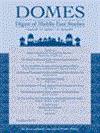

|
|
|
|
|
| Publication |
Hampshire, Ashgate, 2006.
|
| Description |
xvi, 234p.hbk
|
| Standard Number |
0754644812
|
|
|
|
|
|
|
|
|
|
|
|
Copies: C:1/I:0,R:0,Q:0
Circulation
| Accession# | Call# | Current Location | Status | Policy | Location |
| 051501 | 973.931/HUN 051501 | Main | On Shelf | General | |
|
|
|
|
| 4 |
ID:
131076
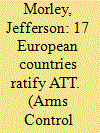

|
|
|
| 5 |
ID:
118920
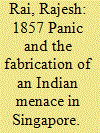

|
|
|
|
|
| Publication |
2013.
|
| Summary/Abstract |
This paper examines how local and transnational developments converged in 1857 to transform European attitudes towards Indian inhabitants in Singapore. Recognized in preceding years as useful to the security and the development of the colony, by late 1857, Indians in Singapore had come to be viewed by Europeans as a 'menace'. That change in disposition was largely the product of factors extraneous to the actions of the local Indian inhabitants themselves. Besieged by news of multiple challenges to the British Empire, European nerves were rattled by perceived threats emanating from sections of the Asian populace in Singapore. In early 1857, a dispute between Tamil-Muslims and Europeans brought to the fore the latter's anxieties and prejudices. That episode was followed, in May, by news of the massive rebellion of native troops in India. The emerging distrust for Indians was exacerbated by public rumours and fanned by editorials and reports published in the local press. Perceptions of immediate danger from the colony of transported convicts, and the fear of an Indian conspiracy during Muharram, sparked a panic that would have ramifications on the position of Indians in Singapore and leave an imprint on the long term political development of the Straits Settlements
|
|
|
|
|
|
|
|
|
|
|
|
|
|
|
|
| 6 |
ID:
131415
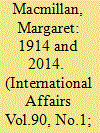

|
|
|
|
|
| Publication |
2014.
|
| Summary/Abstract |
The outbreak of the First World War remains a great historical puzzle and a source of concern, for if we do not understand how it came about we run the risk of stumbling into a similar catastrophe. This article draws parallels between the world of 1914 and the present. It starts with comfortable assumptions made by so many, then and now, that a major conflict was impossible or improbable and then looks at the paradox that globalization not only made the world more interdependent and linked, but also fostered intense local and national identities. It suggests factors that propelled Europe to war in 1914, including national rivalries, imperialism, the arms race and a shifting power balance between rising and declining powers, as well as ideologies and assumptions such as Social Darwinism and militarism, and points out that similar forces and ideas are present today. The article also stresses the dangerous complacency that can arise as a result of decision-makers having successfully dealt with a series of crises. European decision-makers also assumed that they could successfully use war as an instrument of policy and largely ignored or explained away the mounting evidence that the advantage in conflict was swinging to the defence. Again, as the author points out, there are disquieting parallels with the present.
|
|
|
|
|
|
|
|
|
|
|
|
|
|
|
|
| 7 |
ID:
108003
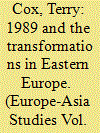

|
|
|
| 8 |
ID:
118440
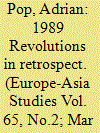

|
|
|
|
|
| Publication |
2013.
|
| Summary/Abstract |
Reminding us of the failure of academia to predict the East European revolutions, and the challenges presented by the latter to the theories of revolution, the essay claims that in order to understand why the exit from communism comprised so many varied modes, one should take a 'path-dependence' diachronic and synchronic comparative perspective. Based on this dual approach and a set of variables, the essay advances a typology of East European revolutions and argues that the issues regarding the type of political regime, the development of civil society and its way of interacting with the state are of paramount importance for comprehending how the 'negotiated revolutions' in Central Europe came about. Finally, the significance of the Central European civil society strategy under late communism for the era of globalisation is addressed.
|
|
|
|
|
|
|
|
|
|
|
|
|
|
|
|
| 9 |
ID:
127497


|
|
|
|
|
| Publication |
2013.
|
| Summary/Abstract |
CELEBRATIONS took place in August 2013 in the Czech Republic and Russia to mark 200 years since the victory in the Battle of Kulm by the allied forces of Russia, Austria and Prussia over Napoleon's forces.
In order to put in perspective this seemingly local and almost forgotten battle in 1813, where valiant Russian soldiers played a decisive part, let us make a brief historical digression to the now distant period that preceded the fighting at Kulm on 29-30 August 1813 and at Leipzig on October 16-18, 1813.
|
|
|
|
|
|
|
|
|
|
|
|
|
|
|
|
| 10 |
ID:
121720
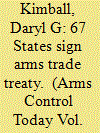

|
|
|
|
|
| Publication |
2013.
|
| Summary/Abstract |
Senior diplomats from 67 European, Latin American, Asian, and African states signed the Arms Trade Treaty (ATT) at the United Nations on June 3.
|
|
|
|
|
|
|
|
|
|
|
|
|
|
|
|
| 11 |
ID:
073918


|
|
|
|
|
| Publication |
London, I B Tauris, 2006.
|
| Description |
viii, 439p.Hbk
|
| Standard Number |
9781860642869
|
|
|
|
|
|
|
|
|
|
|
|
Copies: C:1/I:0,R:1,Q:0
Circulation
| Accession# | Call# | Current Location | Status | Policy | Location |
| 051693 | 907.202/WRI 051693 | Main | On Shelf | Reference books | |
|
|
|
|
| 12 |
ID:
112820
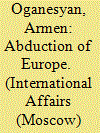

|
|
|
|
|
| Publication |
2012.
|
| Summary/Abstract |
WE ARE WATCHING the "abduction of Europe": the European dream of many generations of great European politicians is melting away. It was immediately after the war that Robert Schuman, Jean Monnet, Winston Churchill, Charles de Gaulle, Konrad Adenauer, Paul-Henri Spaak and many others laid the ideological foundation of united Europe. In 1962, Harold Macmillan disappointed his audience by saying to the EEC prime ministers that his country was determined to integrate into Europe. The British primer was convinced that his country could look forward to economic growth only as part of a big continental bloc. Today, the British press has dismissed this as a superficial and short-sighted approach which nevertheless was accepted by the larger part of the establishment and which cost dearly to the nation. The Brits, however, are often pushed aside as an insular nation. Le Monde of France betrays its concern by asking "Will Europe repeat the history of the USSR?" It admits, with a great deal of bitterness, that the integration institutes and Euro-bureaucracy which have grown out of proportion "are treated in Europe at best with indifference or at worst are totally rejected."
|
|
|
|
|
|
|
|
|
|
|
|
|
|
|
|
| 13 |
ID:
192142
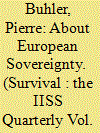

|
|
|
|
|
| Summary/Abstract |
The coining of the concept of ‘European sovereignty’ by French President Emmanuel Macron in 2017 has prompted a heated debate, reviving disputes over supranationality, the nation-state and democracy that have resonated since the inception of the European project. Macron’s intervention came at a time when a flurry of crises compelled the European Union to move from its ambition of being a ‘normative power’ to living through its ‘Machiavellian moment’, against the backdrop of the rise of new global powers and existential threats for the security of the Union and its member states. But the term ‘European sovereignty’ is a misnomer. The real issue is one of power, not of sovereignty. Power proceeds from command, hardly an attribute of the complex shared decision-making process of the EU, leaving the objective of becoming a fully-fledged power out of reach for the European polity.
|
|
|
|
|
|
|
|
|
|
|
|
|
|
|
|
| 14 |
ID:
117411
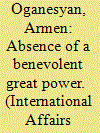

|
|
|
|
|
| Publication |
2012.
|
| Summary/Abstract |
AMERICAN AUTHOR Anne O'Hare McCormick (1880-1954), whose life experience was interwoven with both world wars, packaged into a single phrase the lessons to be derived from the tumultuous epochs when she famously wrote: "Today the real test of power is not capacity to make war but the capacity to prevent it."
|
|
|
|
|
|
|
|
|
|
|
|
|
|
|
|
| 15 |
ID:
128195
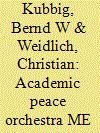

|
|
|
|
|
| Publication |
2013.
|
| Summary/Abstract |
Future Track II activities might concentrate on the level of domestic politics, including empowering civil society movements as the rising agents of change.
|
|
|
|
|
|
|
|
|
|
|
|
|
|
|
|
| 16 |
ID:
013790
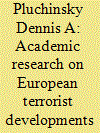

|
|
|
|
|
| Publication |
1992.
|
| Description |
13-23
|
|
|
|
|
|
|
|
|
|
|
|
|
|
|
|
| 17 |
ID:
101168
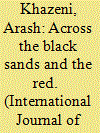

|
|
|
|
|
| Publication |
2010.
|
| Summary/Abstract |
Through a reading of 19th-century Persian travel narratives, this article locates the history of Iran and Central Eurasia within recent literature on global frontier processes and the encounter between empire and nature. It argues that Persianate travel books about Central Eurasia were part of the imperial project to order and reclaim the natural world and were forged through the material encounter with the steppes. Far from a passive act of collecting information and more than merely an extension of the observer's preconceptions, description was essential to the expansion and preservation of empire. Although there exists a vast literature on Western geographical and ethnographic representations of the Middle East, only recently have scholars begun to mine contacts that took place outside of a Western colonial framework and within an Asian setting. Based on an analysis of Riza Quli Khan Hidayat's Sifaratnama-yi Khvarazm, the record of an expedition sent from the Qajar Dynasty to the Oxus River in 1851, the article explores the 19th-century Muslim "discovery" of the Eurasian steppe world. The expedition set out to define imperial boundaries and to reclaim the desert, but along the way it found a permeable "middle ground" between empires, marked by transfrontier and cross-cultural exchanges.
|
|
|
|
|
|
|
|
|
|
|
|
|
|
|
|
| 18 |
ID:
134072
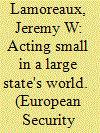

|
|
|
|
|
| Publication |
2014.
|
| Summary/Abstract |
The interest in small states ebbs and flows as important international affairs include small states. Russia's actions and policies vis-à-vis Ukraine, and the resultant intensified apprehension among Russia's smaller neighbours, aim the proverbial microscope at the size and power discrepancies between states. Russia, by most metrics, is a large state and the Baltic states, by those same metrics, are small states. Small-state scholars expect large and small states to act differently. However, the case of Russia and the Baltic states indicates that large and small states do not, in fact, act all that different. This being the case, this article calls into question many of the assumptions made by small-state scholars about the difference between large- and small-state action and argues for changes within small-state studies as a subdiscipline of the larger international relations discipline.
|
|
|
|
|
|
|
|
|
|
|
|
|
|
|
|
| 19 |
ID:
073240


|
|
|
| 20 |
ID:
086323


|
|
|
|
|
| Publication |
2009.
|
| Summary/Abstract |
After more than a decade of preparation, China finally passed the Anti-Monopoly Law (AML) on 30 August 2007. This paper examines the debate over whether or not administrative monopoly should be included in the ambit of the AML, which took place throughout the drafting process of this new law. Administrative monopoly refers to the abusive use of administrative power by government agencies to engage in monopolistic activities. Owing to the administrative nature of this type of monopoly, the intent to regulate it by an economic law, such as the AML, has stirred up much controversy. Having analyzed the arguments both in support of and in opposition to the inclusion, this paper suggests the need to adopt a more comprehensive scheme in tackling administrative monopoly. Also, the enforcement mechanism of the AML will have to be strengthened in order to prevent this new law from degenerating into 'a toothless tiger'. Furthermore, the competition law regime of China will benefit from in-depth research in overseas anti-monopoly practices. In particular, the experiences of the former socialist states in Europe should be taken into account, given that they are similarly undergoing the transition from a planned economy to a market economy.
|
|
|
|
|
|
|
|
|
|
|
|
|
|
|
|
|
|
|
|
|